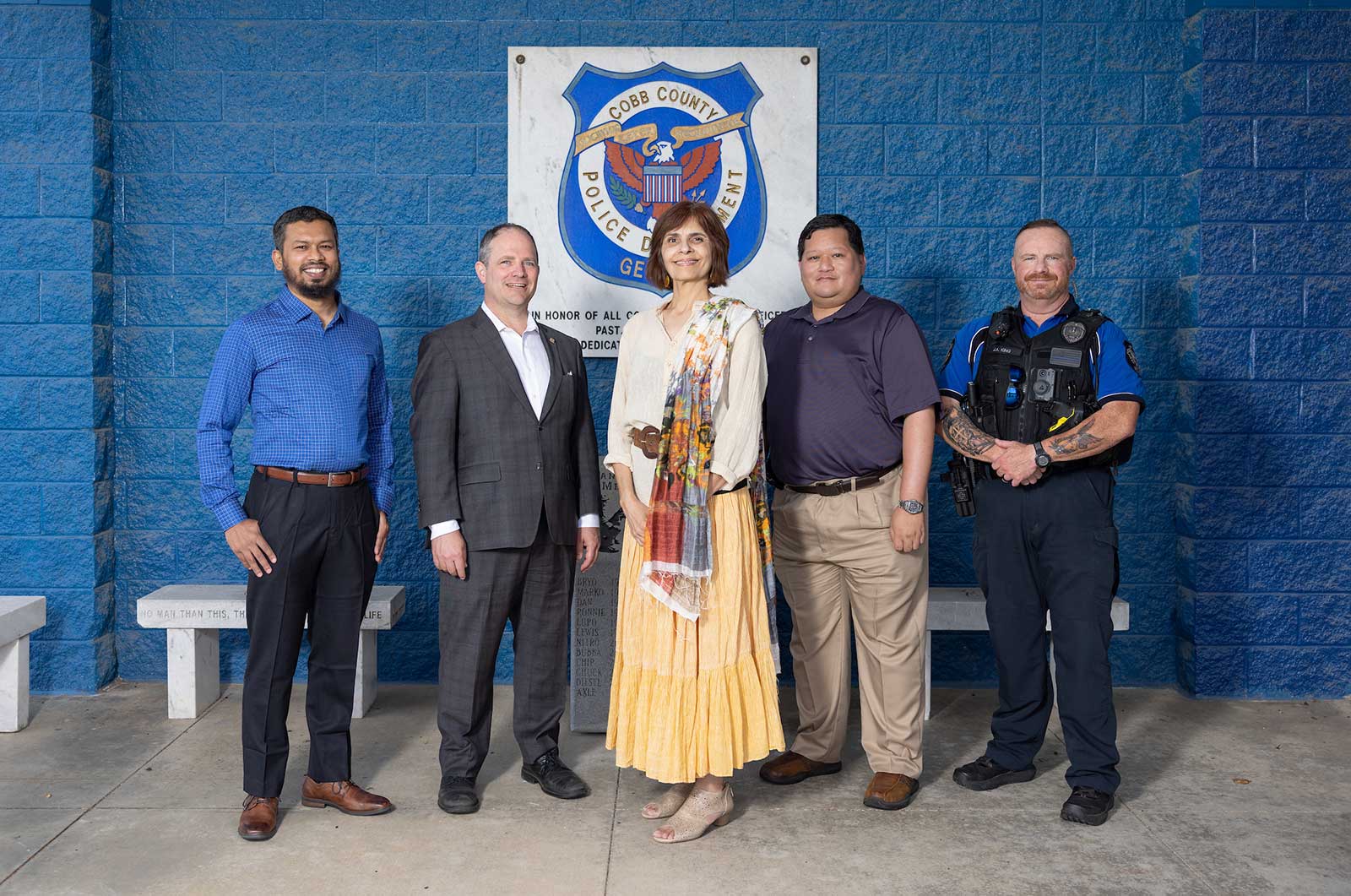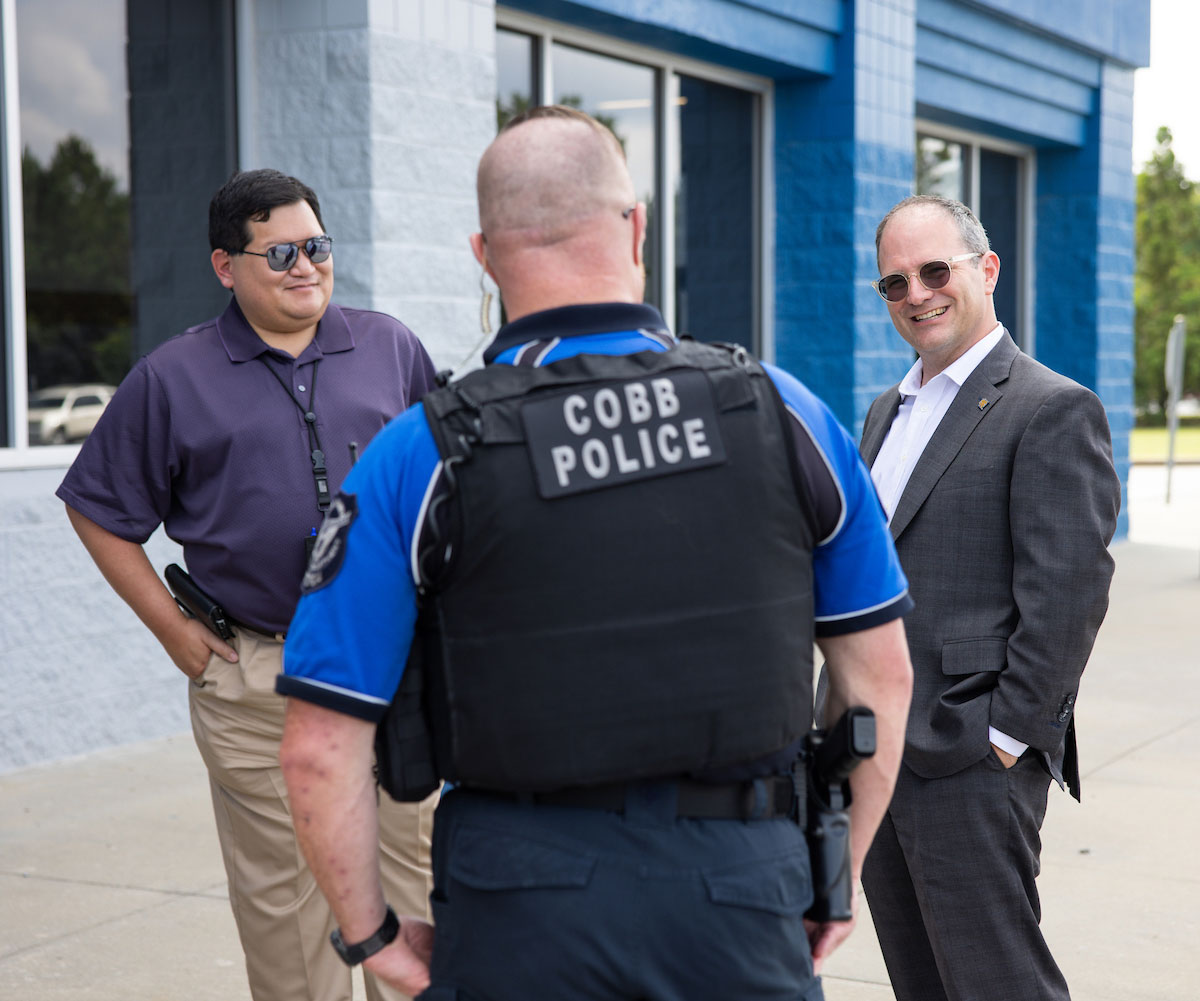

KENNESAW, Ga. | Jul 10, 2023
A Kennesaw State University research team is working to develop new systems and software that could help first responders better handle emergency calls for mental health issues in Georgia and beyond.
The idea began when Cobb Police and Fire recognized the need for help dealing with the overwhelming number of 911 calls they received about people in emotional distress.
“We met to better understand the scope of the issue they were facing and we’re shocked to learn that as much as 30 percent of the calls responded to by police could pertain to behavioral health and need some kind of follow-up. Almost 11 percent of those could require an immediate clinical intervention,” said Monica Nandan, professor of social work and human services and director of strategic partnerships and social impact in the Wellstar College of Health and Human Services.

Working with Cobb Police, Cobb Fire, local ambulance services, the Cobb County Crisis Intervention Team and county commissioners, the Kennesaw State research team are using anonymized police incident reports to create systems that will help evaluate calls and dispatch appropriate help.
“We know that many people in mental health crises end up in jails or in hospitals and the number of calls related to that put a lot of strain on first responders,” said Dominic Thomas, KSU associate professor of information systems. “We’re trying to streamline and improve all the systems, structures and workflows of behavioral health calls and hopefully direct more people into something like crisis counseling, which is a better outcome for everyone, rather than jail or the hospital.”
Software in development as part of the project will allow authorities to search reports by keywords, type of incident and more, making it easier to follow up on specific and pressing calls. According to Thomas, one of the team’s priorities is to set up an interactive dashboard for the 911 call centers that operators can use in real time to direct the correct responders — often a co-response team of a police officer and licensed professional counselor — to identified mental health calls. It will also allow more appropriate responses to different types of crises and cut down on call loads for first responders, who are often spread thin.
“We’re trying to make sure our public safety department can quickly identify which calls need immediate behavioral health assistance and which ones can be addressed relatively soon to ensure everyone involved feels safe and 911 calls do not have to be repeated,” Nandan said.
The ultimate goal of the project is to provide better mental health care across Georgia and the nation.
Cobb County Police Officer Jacob King and Matthew Dames, a licensed professional counselor with Highland Rivers Behavioral Health, are one of two co-response teams created by the county in 2019. Three years after the creation of those teams in Cobb, the passage of a 2022 state bill required a police officer and clinician to respond to mental health calls in every Georgia county.
King and Dames said while the partnerships between police and mental health professionals have made a difference, KSU’s work and development of tools for first responders will essentially end their reliance on external referral sources to identify community members in need of mental health assistance.
“Being able to monitor incident reports for signs of individuals in need of assistance in near real time allows us to avoid cases potentially falling through the cracks due to a formal referral not being made,” King said.

While the scope of the problem is large, the focus on mental health response and treatment has not risen to the level that it should, according to Md Abdullah Al Hafiz Khan, assistant professor of computer science, and member of the KSU research team, which in addition to Nandan and Thomas includes Yong Pei, chair of the Department of Computer Science and professor of computer science, and several Kennesaw State graduate students.
Once the team gets Cobb County up and running, they plan to expand to city police departments within the county, as well as to fire departments.
“Like many other things in Cobb County, when we start something and lead on something, it often spreads elsewhere,” said state Sen. Kay Kirkpatrick, one of Cobb’s legislators who is also a medical doctor. “I think we obviously need to have all hands on deck with mental illness response, and jail is not going to solve the problem. Having these partnerships to solve issues like this is a great idea, and the partnership with KSU is only going to make that stronger.”
– By Thomas Hartwell
Photos by Matt Yung
A leader in innovative teaching and learning, Kennesaw State University offers undergraduate, graduate, and doctoral degrees to its more than 51,000 students. Kennesaw State is a member of the University System of Georgia with 11 academic colleges. The university's vibrant campus culture, diverse population, strong global ties, and entrepreneurial spirit draw students from throughout the country and the world. Kennesaw State is a Carnegie-designated doctoral research institution (R2), placing it among an elite group of only 8 percent of U.S. colleges and universities with an R1 or R2 status. For more information, visit kennesaw.edu.